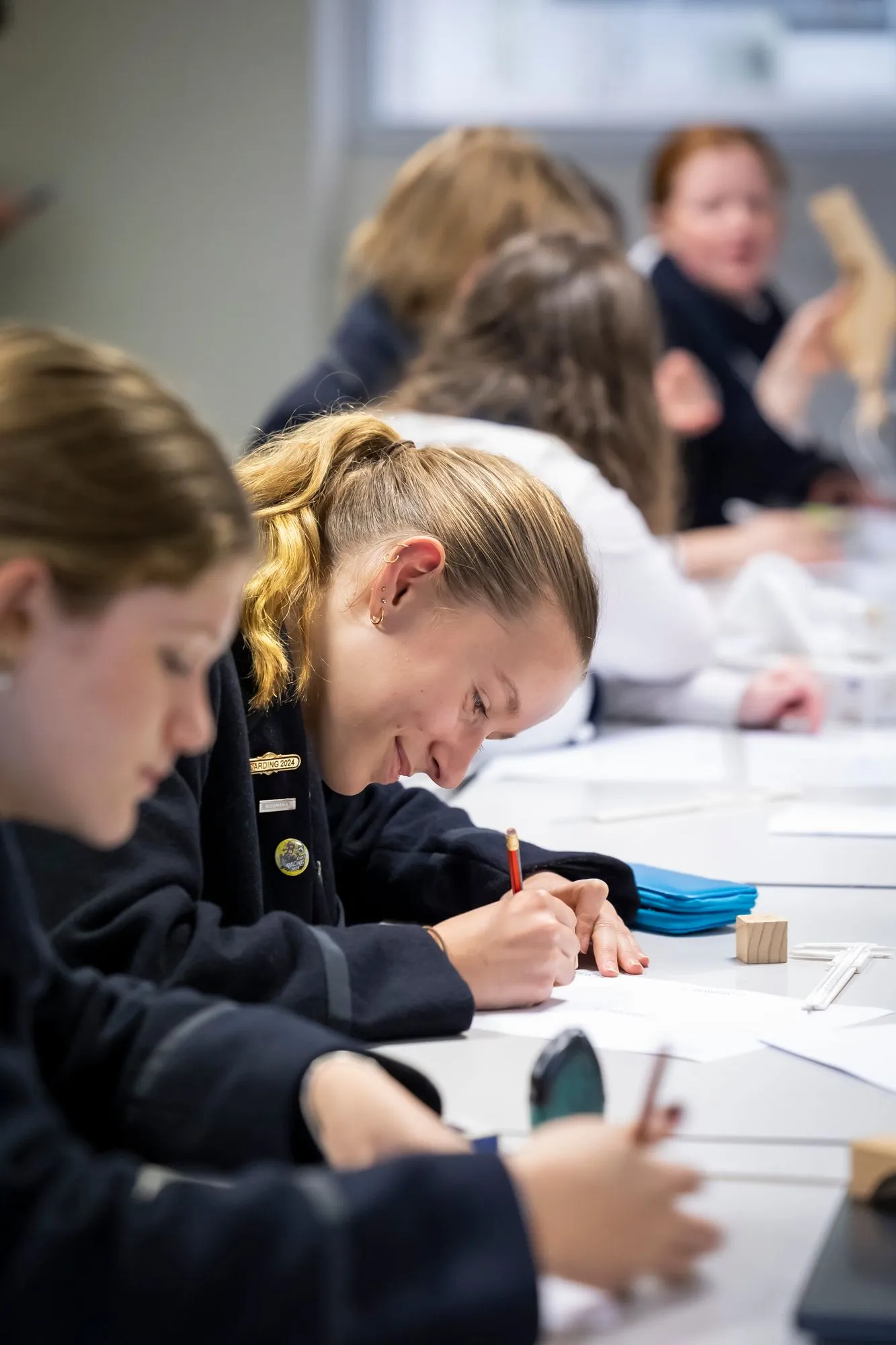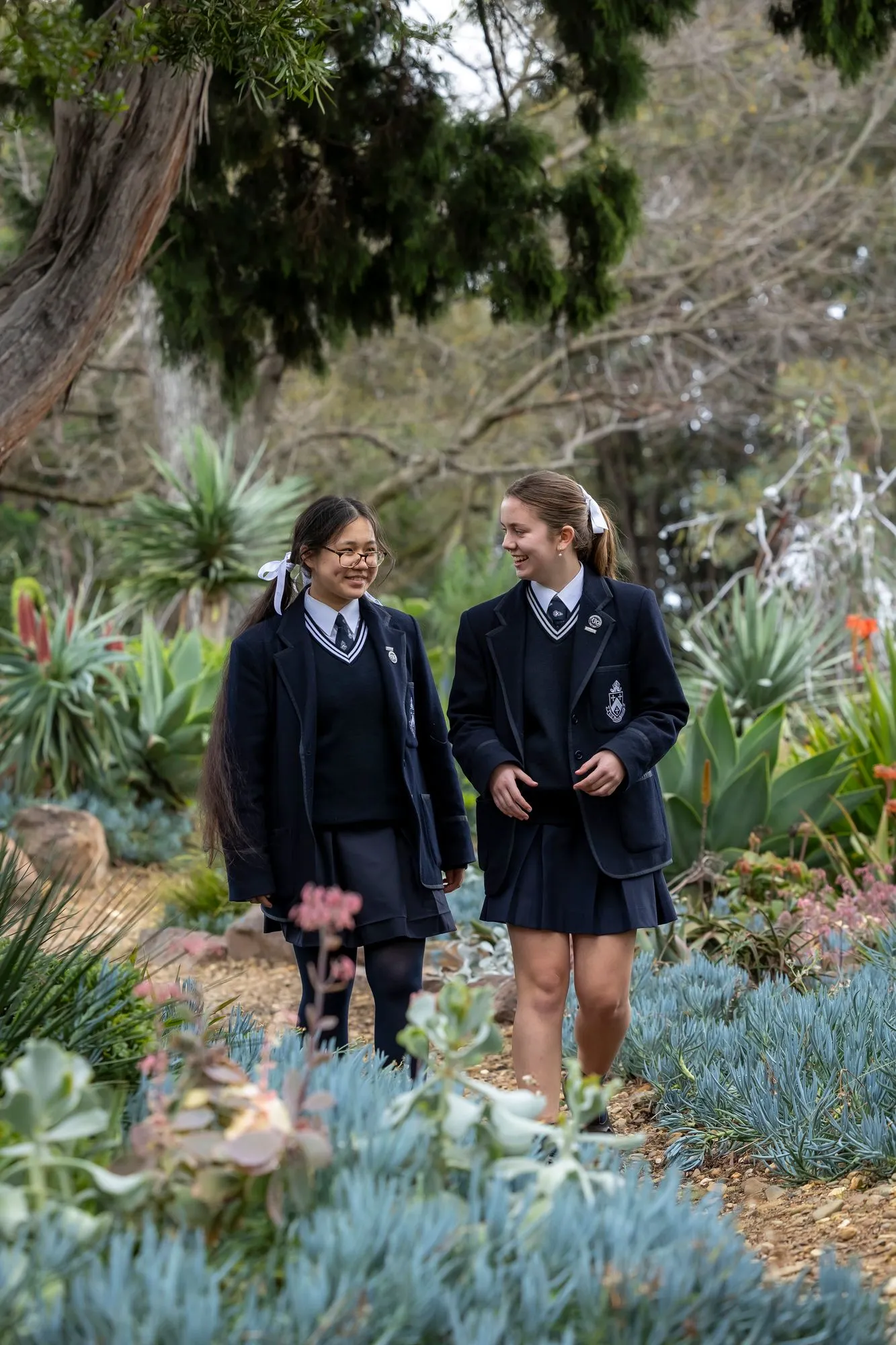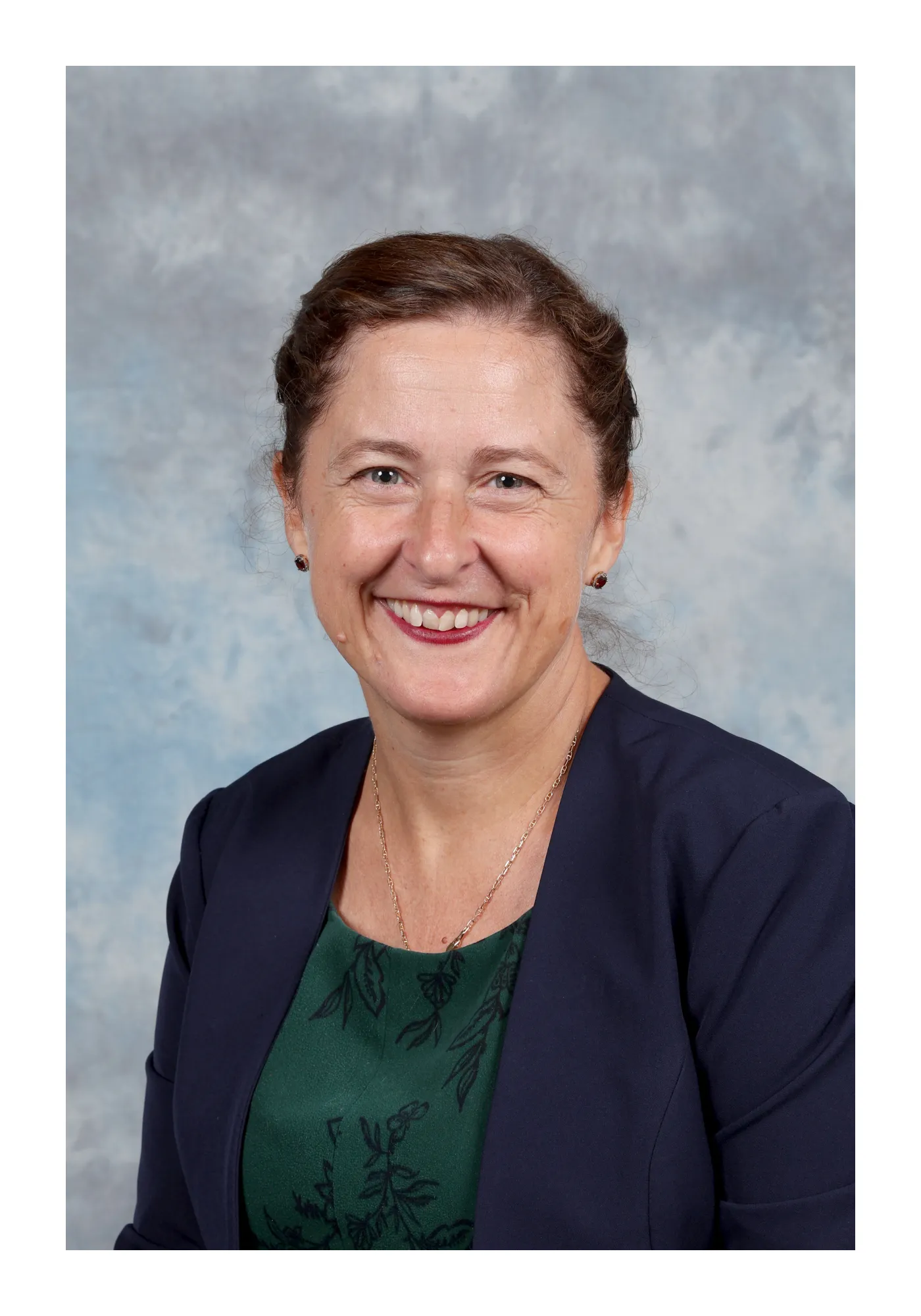

Ms Lynda Wall joins MGGS in 2024 as Deputy Principal: Education leadership, Academic


Ms Lynda Wall joins MGGS in 2024 as Deputy Principal: Education leadership, Academic
The Hallmarks of Learning at MGGS
This year we have had the pleasure of welcoming Ms Lynda Wall into the position of Deputy Principal: Education leadership, Academic. She brings over 20 years of experience in girls’ education to Melbourne Girls Grammar, having previously worked in the positions of Deputy Principal at Ipswich Girls’ Grammar School and Dean of Studies at St Aidan’s Anglican Girls’ School, one of Queensland’s highest achieving girls’ schools. Her educational philosophy is focused on engaging students with learning opportunities that extend the boundaries of how they imagine their futures, as well as deepening their understanding of themselves, others, and the situations they encounter.
Ms Wall works closely with Mrs Broadway and Dr Meath alongside the Executive Team, and she is equally engaging with students across year levels to gauge how we can be better students and leaders. She has already presented to us on revision strategies, such as spaced repetition, and has discussed with different year levels on how we can be best supported in an academic context.
We are very excited and incredibly grateful to have Ms Wall as part of the MGGS community.
— Emily Walters, Amelia Banks and Sophie Johnson, 2024 School Captains

Practice, Effort and Focus: The Hallmarks of Learning at MGGS
As a world-class school, Melbourne Girls Grammar provides a model of education in which Grammarians develop the foundational knowledge structures needed to make sense of complexity, as well as developing understanding of how learning occurs. Graduates who leave school knowing how to learn independently are better equipped for life beyond school.
Educating our Grammarians how to optimise their learning is an aspect of our Middle and Senior Years curriculum. It includes understanding how to study and ‘rehearse’ new knowledge, how to self-assess their progress, and how to tackle complex learning challenges with confidence.
Practice, Effort and Focus: The Hallmarks of Learning at MGGS
As a world-class school, Melbourne Girls Grammar provides a model of education in which Grammarians develop the foundational knowledge structures needed to make sense of complexity, as well as developing understanding of how learning occurs. Graduates who leave school knowing how to learn independently are better equipped for life beyond school.
Educating our Grammarians how to optimise their learning is an aspect of our Middle and Senior Years curriculum. It includes understanding how to study and ‘rehearse’ new knowledge, how to self-assess their progress, and how to tackle complex learning challenges with confidence.
Practice, Effort and Focus: The Hallmarks of Learning at MGGS
As a world-class school, Melbourne Girls Grammar provides a model of education in which Grammarians develop the foundational knowledge structures needed to make sense of complexity, as well as developing understanding of how learning occurs. Graduates who leave school knowing how to learn independently are better equipped for life beyond school.
Educating our Grammarians how to optimise their learning is an aspect of our Middle and Senior Years curriculum. It includes understanding how to study and ‘rehearse’ new knowledge, how to self-assess their progress, and how to tackle complex learning challenges with confidence.

Practice
In a recent Senior Years Assembly, students were quizzed about their understanding of Ebbinghaus’s ‘Forgetting Curve’, a theory about memory retention first proposed in 1885. The Forgetting Curve hypothesises that information encountered only once will be quickly forgotten. However, revision at spaced intervals, with lengthening spaces between revisions, will greatly increase memory retention. Critical to the subsequent studies that have affirmed the theory is the idea of spacing practices; memories will be formed if the mind is trained by lengthening gaps so that remembering is an active reach for information rather than a passive recitation of rote learning. At the assembly and in lessons about learning, what our Grammarians discover is that building long-term recall, critical for learning, is challenging but achievable with effort.
Practice
In a recent Senior Years Assembly, students were quizzed about their understanding of Ebbinghaus’s ‘Forgetting Curve’, a theory about memory retention first proposed in 1885. The Forgetting Curve hypothesises that information encountered only once will be quickly forgotten. However, revision at spaced intervals, with lengthening spaces between revisions, will greatly increase memory retention. Critical to the subsequent studies that have affirmed the theory is the idea of spacing practices; memories will be formed if the mind is trained by lengthening gaps so that remembering is an active reach for information rather than a passive recitation of rote learning. At the assembly and in lessons about learning, what our Grammarians discover is that building long-term recall, critical for learning, is challenging but achievable with effort.
Practice
In a recent Senior Years Assembly, students were quizzed about their understanding of Ebbinghaus’s ‘Forgetting Curve’, a theory about memory retention first proposed in 1885. The Forgetting Curve hypothesises that information encountered only once will be quickly forgotten. However, revision at spaced intervals, with lengthening spaces between revisions, will greatly increase memory retention. Critical to the subsequent studies that have affirmed the theory is the idea of spacing practices; memories will be formed if the mind is trained by lengthening gaps so that remembering is an active reach for information rather than a passive recitation of rote learning. At the assembly and in lessons about learning, what our Grammarians discover is that building long-term recall, critical for learning, is challenging but achievable with effort.
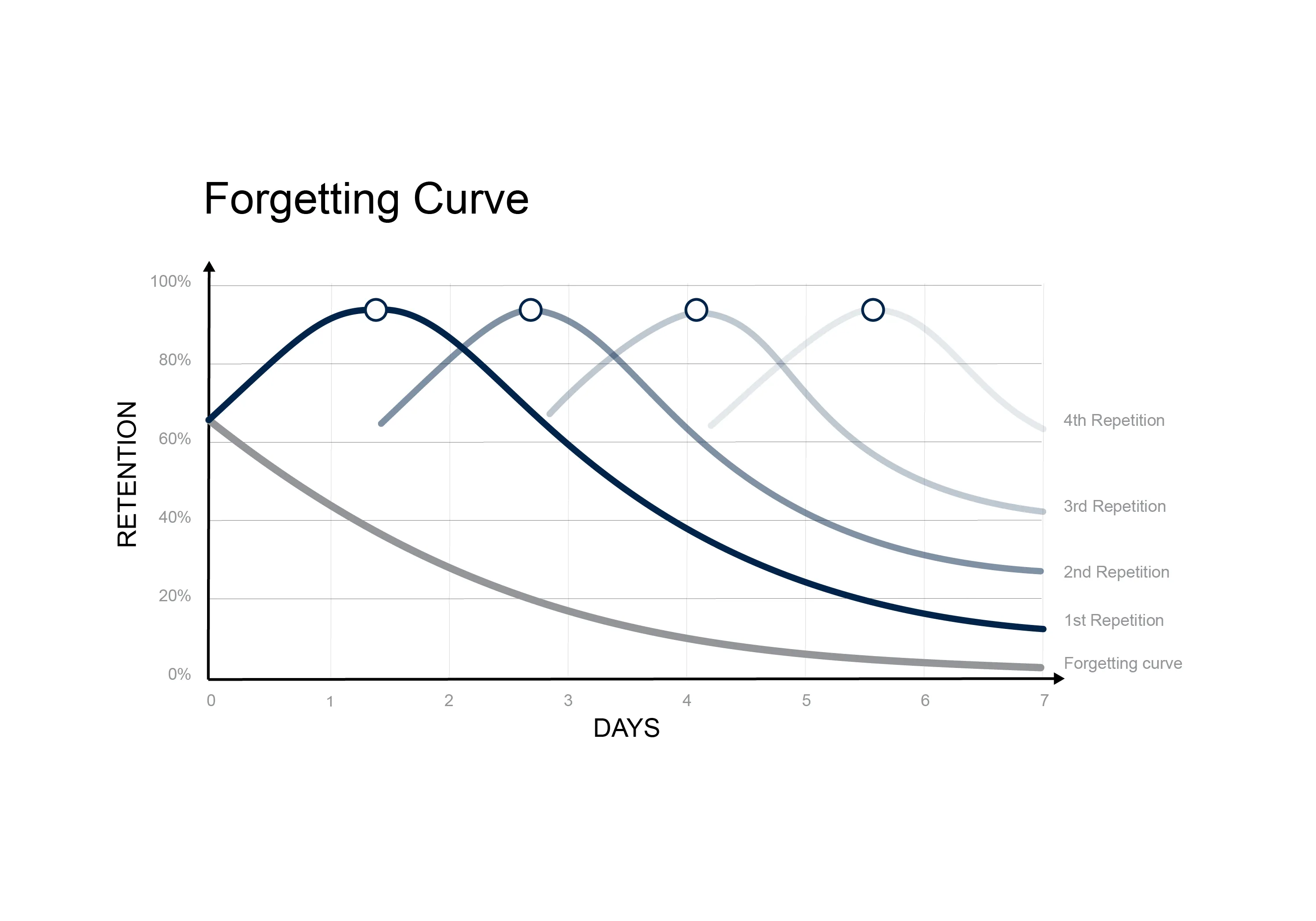

Ebbinghaus is known for his 'forgetting curve', which suggests that people tend to continually halve their memory of newly learned information in a matter of days or weeks unless they actively review the learned material. He also studied the value of practicing at spaced intervals over time to promote retention.



Ebbinghaus is known for his 'forgetting curve', which suggests that people tend to continually halve their memory of newly learned information in a matter of days or weeks unless they actively review the learned material. He also studied the value of practicing at spaced intervals over time to promote retention.

Long-term memory is a central to any learning process. Dylan William, Emeritus Professor of Educational Assessment at University College London, draws upon the work of Kirschner, Sweller and Clark (2006) to explain that the essential characteristic of learning is that it results in change in long-term memory.
"A focus on memory shouldn’t be conflated with rote-memorisation, rather it is about students being able to reproduce learning, including higher order thinking and processes, independently at a later date."
A focus on memory shouldn’t be conflated with rote-memorisation, rather it is about students being able to reproduce learning, including higher order thinking and processes, independently at a later date. For example, a student who can write a compellingly argued interpretation of a section of a Shakespearean play immediately after the teacher has explained the vocabulary and meaning cannot be said to have learned, if they can’t write an argument about the same or any other play independently some time later. The performance of a skill in class, under direct supervision of an expert, is an example of working memory, rather than long-term memory. Our Grammarians understand that effective learning occurs when the knowledge and processes introduced into working memory by direct instruction are transferred to long-term memory, able to be accessed by the learner at any time. Building long-term memory lays down the foundational knowledge structures which our students can begin to interpret new information.
For Grammarians in the Middle and Senior Years programs, understanding that learning relies on memory is a motivator for independent practice after instruction. Students at Melbourne Girls Grammar learn to complete practice exercises, either in class, in Independent Learning Time at school, or for homework, as part of every learning experience. Grammarians from a very young age also learn that when completing practices, the key to success is to focus on challenge. As any musician knows, focusing on skills that have already been mastered doesn’t lead to improvement. Instead, a musician learning a piece for performance will spend the most time going over the hardest passages, playing them repeatedly, rather than always playing the full piece including easier sections from beginning to end. The model for Learning Extension in the Middle Years at MGGS allows students to increase challenge through working in targeted groups in Years 5 and 6, as well as following the more challenging work set on eVI class pages in Year 7 and beyond. For many students in the Senior Years, subject-specific practice includes reviewing more challenging critical readings or undertaking more complex translations or problem-solving.
Long-term memory is a central to any learning process. Dylan William, Emeritus Professor of Educational Assessment at University College London, draws upon the work of Kirschner, Sweller and Clark (2006) to explain that the essential characteristic of learning is that it results in change in long-term memory.
"A focus on memory shouldn’t be conflated with rote-memorisation, rather it is about students being able to reproduce learning, including higher order thinking and processes, independently at a later date."
A focus on memory shouldn’t be conflated with rote-memorisation, rather it is about students being able to reproduce learning, including higher order thinking and processes, independently at a later date. For example, a student who can write a compellingly argued interpretation of a section of a Shakespearean play immediately after the teacher has explained the vocabulary and meaning cannot be said to have learned, if they can’t write an argument about the same or any other play independently some time later. The performance of a skill in class, under direct supervision of an expert, is an example of working memory, rather than long-term memory. Our Grammarians understand that effective learning occurs when the knowledge and processes introduced into working memory by direct instruction are transferred to long-term memory, able to be accessed by the learner at any time. Building long-term memory lays down the foundational knowledge structures which our students can begin to interpret new information.
For Grammarians in the Middle and Senior Years programs, understanding that learning relies on memory is a motivator for independent practice after instruction. Students at Melbourne Girls Grammar learn to complete practice exercises, either in class, in Independent Learning Time at school, or for homework, as part of every learning experience. Grammarians from a very young age also learn that when completing practices, the key to success is to focus on challenge. As any musician knows, focusing on skills that have already been mastered doesn’t lead to improvement. Instead, a musician learning a piece for performance will spend the most time going over the hardest passages, playing them repeatedly, rather than always playing the full piece including easier sections from beginning to end. The model for Learning Extension in the Middle Years at MGGS allows students to increase challenge through working in targeted groups in Years 5 and 6, as well as following the more challenging work set on eVI class pages in Year 7 and beyond. For many students in the Senior Years, subject-specific practice includes reviewing more challenging critical readings or undertaking more complex translations or problem-solving.
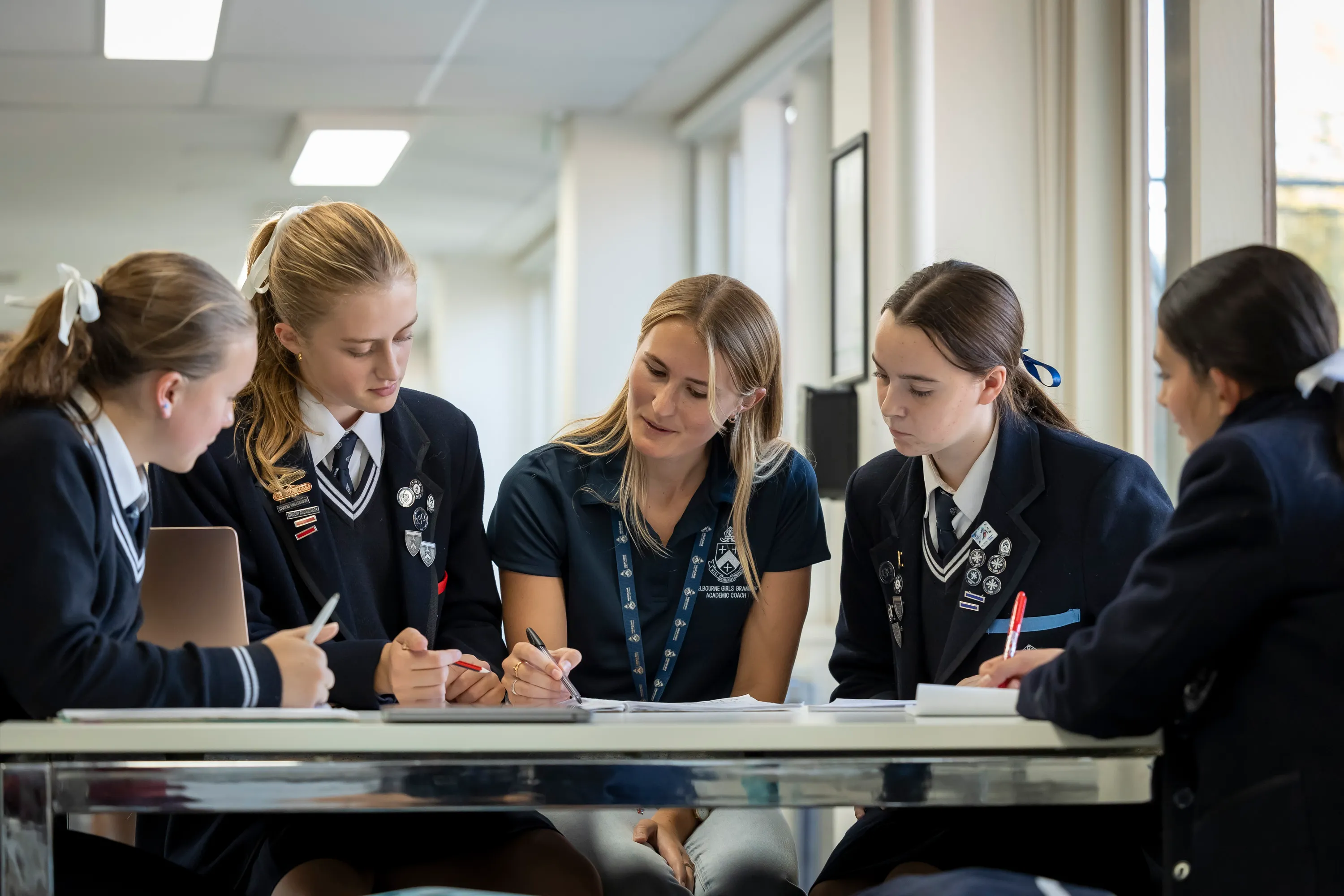

Academic Coach and Old Grammarian Phoebe Faulks (2021) works with students in Years 10 and 11 in the Ross Hall Learning Commons.



Academic Coach and Old Grammarian Phoebe Faulks (2021) works with students in Years 10 and 11 in the Ross Hall Learning Commons.


Academic Coach and Old Grammarian Phoebe Faulks (2021) works with students in Years 10 and 11 in the Ross Hall Learning Commons.

Effort
Recently, when writing a reflection on the 2023 school year, one of our Latin teachers wrote of the joy of ‘the pleasure of the rigour’. Initially coined by Dr Meath in relation to the distinct learning that takes place at Melbourne Girls Grammar, it’s a phrase that encapsulates the intellectual discipline of true learning where students are fully active in the learning process. Active approaches to learning are well-evidenced and have been a strong focus at MGGS, with Middle Years teachers particularly focussing on the beginning of lessons that require demonstration of knowledge and thinking from every student. In the first few minutes of the lesson, known to students as the ‘do now’ portion of the lesson this can be seen in action.
For our older Grammarians, significant learning occurs beyond the classroom; a challenging VCE program necessarily includes self-directed study. In establishing their understanding of study skills in the Senior Years, students are taught about the efficacy of active rather than passive learning practices. Active learning is always on display in the Learning Commons and Year 12 Common Room, where groups of students can be seen revising individually, in small groups and en masse. It is common to see students undertaking quizzes, constructing mind maps, summarising from memory, writing essays, drawing diagrams and flow charts, and otherwise finding ways to rethink and transform information to build strong neural connections.
The development of study skills is supported by Academic Coaches, high-achieving former students based in the Learning Commons who can provide guidance on organisation and study techniques. The academic coaches are trained specifically to assist current VCE students to adopt effective study techniques and help them to be organised and be active and strategic in how they approach their independent learning time. When visiting the Learning Commons, one can frequently witness the triumph of small groups of students solving problems or organising information on one of the whiteboards. By taking ownership of their study, our Grammarians are building much stronger foundations than if they adopted the more passive approaches of only listening to instruction, re-reading notes or otherwise attempting to absorb information without effort. This active learning approach enables students to manage the development of their learning, with the foundational base provided by clear instruction in subject disciplines.
"By taking ownership of their study, our Grammarians are building much stronger foundations than if they adopted the more passive approaches of only listening to instruction, re-reading notes or otherwise attempting to absorb information without effort."
Effort
Recently, when writing a reflection on the 2023 school year, one of our Latin teachers wrote of the joy of ‘the pleasure of the rigour’. Initially coined by Dr Meath in relation to the distinct learning that takes place at Melbourne Girls Grammar, it’s a phrase that encapsulates the intellectual discipline of true learning where students are fully active in the learning process. Active approaches to learning are well-evidenced and have been a strong focus at MGGS, with Middle Years teachers particularly focussing on the beginning of lessons that require demonstration of knowledge and thinking from every student. In the first few minutes of the lesson, known to students as the ‘do now’ portion of the lesson this can be seen in action.
For our older Grammarians, significant learning occurs beyond the classroom; a challenging VCE program necessarily includes self-directed study. In establishing their understanding of study skills in the Senior Years, students are taught about the efficacy of active rather than passive learning practices. Active learning is always on display in the Learning Commons and Year 12 Common Room, where groups of students can be seen revising individually, in small groups and en masse. It is common to see students undertaking quizzes, constructing mind maps, summarising from memory, writing essays, drawing diagrams and flow charts, and otherwise finding ways to rethink and transform information to build strong neural connections.
The development of study skills is supported by Academic Coaches, high-achieving former students based in the Learning Commons who can provide guidance on organisation and study techniques. The academic coaches are trained specifically to assist current VCE students to adopt effective study techniques and help them to be organised and be active and strategic in how they approach their independent learning time. When visiting the Learning Commons, one can frequently witness the triumph of small groups of students solving problems or organising information on one of the whiteboards. By taking ownership of their study, our Grammarians are building much stronger foundations than if they adopted the more passive approaches of only listening to instruction, re-reading notes or otherwise attempting to absorb information without effort. This active learning approach enables students to manage the development of their learning, with the foundational base provided by clear instruction in subject disciplines.
"By taking ownership of their study, our Grammarians are building much stronger foundations than if they adopted the more passive approaches of only listening to instruction, re-reading notes or otherwise attempting to absorb information without effort."
Effort
Recently, when writing a reflection on the 2023 school year, one of our Latin teachers wrote of the joy of ‘the pleasure of the rigour’. Initially coined by Dr Meath in relation to the distinct learning that takes place at Melbourne Girls Grammar, it’s a phrase that encapsulates the intellectual discipline of true learning where students are fully active in the learning process. Active approaches to learning are well-evidenced and have been a strong focus at MGGS, with Middle Years teachers particularly focussing on the beginning of lessons that require demonstration of knowledge and thinking from every student. In the first few minutes of the lesson, known to students as the ‘do now’ portion of the lesson this can be seen in action.
For our older Grammarians, significant learning occurs beyond the classroom; a challenging VCE program necessarily includes self-directed study. In establishing their understanding of study skills in the Senior Years, students are taught about the efficacy of active rather than passive learning practices. Active learning is always on display in the Learning Commons and Year 12 Common Room, where groups of students can be seen revising individually, in small groups and en masse. It is common to see students undertaking quizzes, constructing mind maps, summarising from memory, writing essays, drawing diagrams and flow charts, and otherwise finding ways to rethink and transform information to build strong neural connections.
The development of study skills is supported by Academic Coaches, high-achieving former students based in the Learning Commons who can provide guidance on organisation and study techniques. The academic coaches are trained specifically to assist current VCE students to adopt effective study techniques and help them to be organised and be active and strategic in how they approach their independent learning time. When visiting the Learning Commons, one can frequently witness the triumph of small groups of students solving problems or organising information on one of the whiteboards. By taking ownership of their study, our Grammarians are building much stronger foundations than if they adopted the more passive approaches of only listening to instruction, re-reading notes or otherwise attempting to absorb information without effort. This active learning approach enables students to manage the development of their learning, with the foundational base provided by clear instruction in subject disciplines.
"By taking ownership of their study, our Grammarians are building much stronger foundations than if they adopted the more passive approaches of only listening to instruction, re-reading notes or otherwise attempting to absorb information without effort."

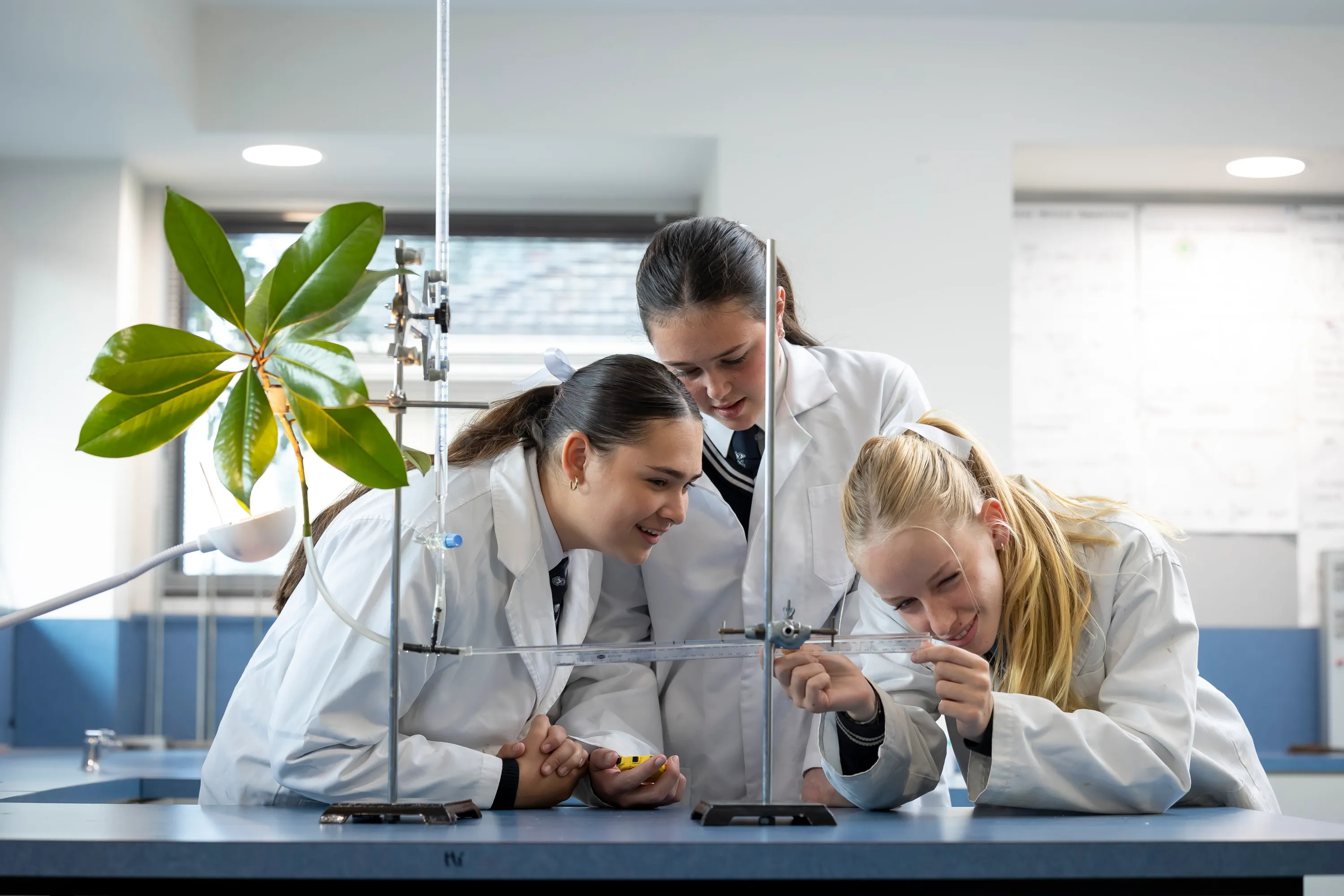




Cleo, Amelie and Mathilda in Year 10 complete a photosynthesis experiment in Biology.


Cleo, Amelie and Mathilda in Year 10 complete a photosynthesis experiment in Biology.

Focus
Teaching of metacognitive awareness is one of the pedagogical principles that underpins all teaching at Melbourne Girls Grammar and is critical to our Grammarians developing independence in their learning. Metacognition is the process of monitoring, managing and evaluating cognitive activities. This involves being able to self-evaluate their progress in learning and their success against either self-directed or external criteria. The processes of generalisation, extrapolation and reasoning are all metacognitive skills that teachers support by inviting students to analyse what success in learning in a particular subject-discipline might look like. Students analyse multiple model answers, make peer-to-peer judgements about work quality, apply rubrics, and work from foundational to specialist knowledge. Immersion in cultural knowledge is also crucial to the development of metacognitive skills. Our Grammarians develop this knowledge through exposure to authentic performance: to art, theatre, literature, scientific and philosophical debate, mathematical models and the critical decision-making underpinning all courses of study.
By providing students with understanding of the learning process, they are given the power to deep dive into, self-direct and access knowledge and experience beyond the confines of a lock-step approach. To truly achieve learning, and flow, what is required of each Grammarian is to commit attention, intellectually and physically, to the process of learning.
Focus
Teaching of metacognitive awareness is one of the pedagogical principles that underpins all teaching at Melbourne Girls Grammar and is critical to our Grammarians developing independence in their learning. Metacognition is the process of monitoring, managing and evaluating cognitive activities. This involves being able to self-evaluate their progress in learning and their success against either self-directed or external criteria. The processes of generalisation, extrapolation and reasoning are all metacognitive skills that teachers support by inviting students to analyse what success in learning in a particular subject-discipline might look like. Students analyse multiple model answers, make peer-to-peer judgements about work quality, apply rubrics, and work from foundational to specialist knowledge. Immersion in cultural knowledge is also crucial to the development of metacognitive skills. Our Grammarians develop this knowledge through exposure to authentic performance: to art, theatre, literature, scientific and philosophical debate, mathematical models and the critical decision-making underpinning all courses of study.
By providing students with understanding of the learning process, they are given the power to deep dive into, self-direct and access knowledge and experience beyond the confines of a lock-step approach. To truly achieve learning, and flow, what is required of each Grammarian is to commit attention, intellectually and physically, to the process of learning.
Focus
Teaching of metacognitive awareness is one of the pedagogical principles that underpins all teaching at Melbourne Girls Grammar and is critical to our Grammarians developing independence in their learning. Metacognition is the process of monitoring, managing and evaluating cognitive activities. This involves being able to self-evaluate their progress in learning and their success against either self-directed or external criteria. The processes of generalisation, extrapolation and reasoning are all metacognitive skills that teachers support by inviting students to analyse what success in learning in a particular subject-discipline might look like. Students analyse multiple model answers, make peer-to-peer judgements about work quality, apply rubrics, and work from foundational to specialist knowledge. Immersion in cultural knowledge is also crucial to the development of metacognitive skills. Our Grammarians develop this knowledge through exposure to authentic performance: to art, theatre, literature, scientific and philosophical debate, mathematical models and the critical decision-making underpinning all courses of study.
By providing students with understanding of the learning process, they are given the power to deep dive into, self-direct and access knowledge and experience beyond the confines of a lock-step approach. To truly achieve learning, and flow, what is required of each Grammarian is to commit attention, intellectually and physically, to the process of learning.





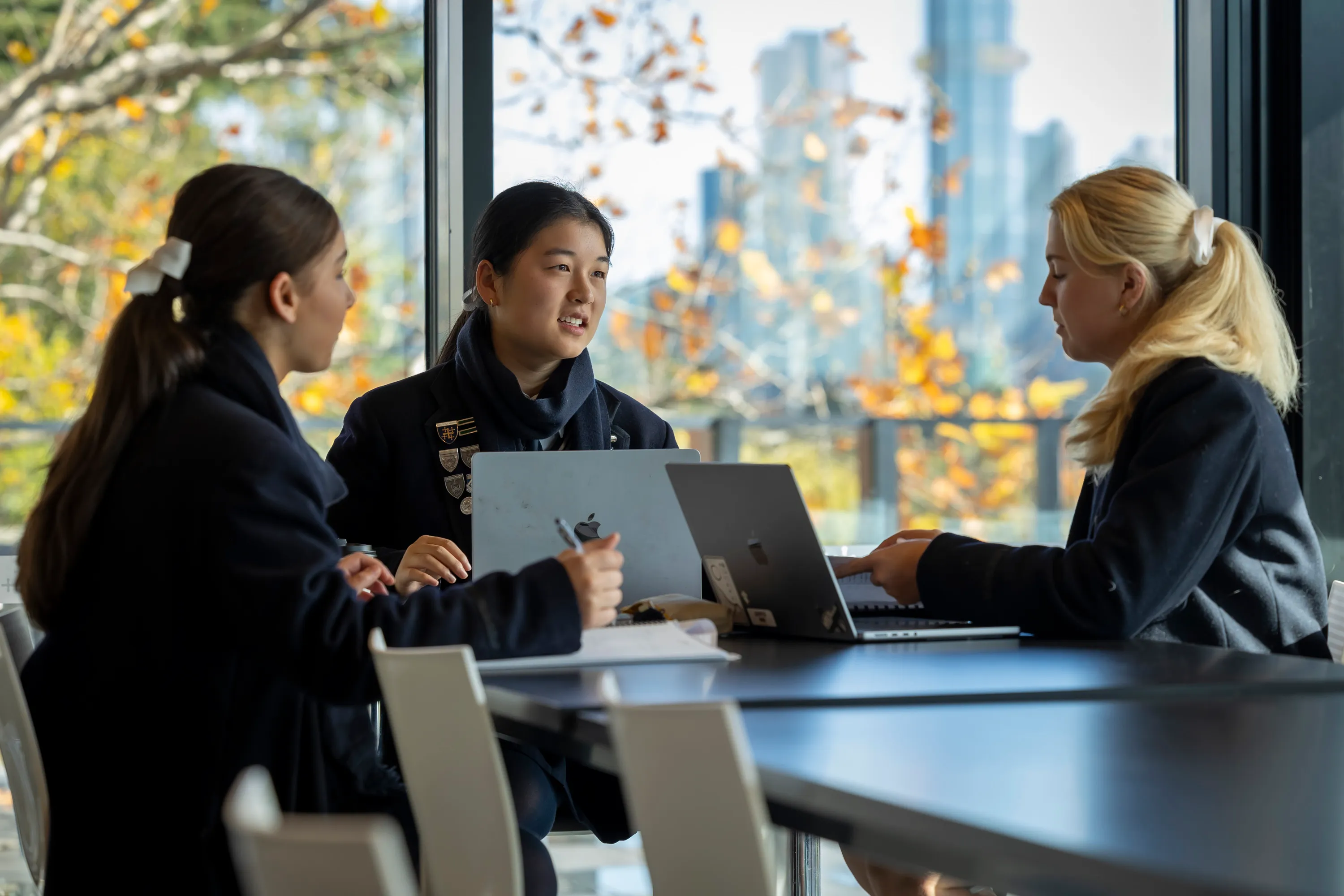


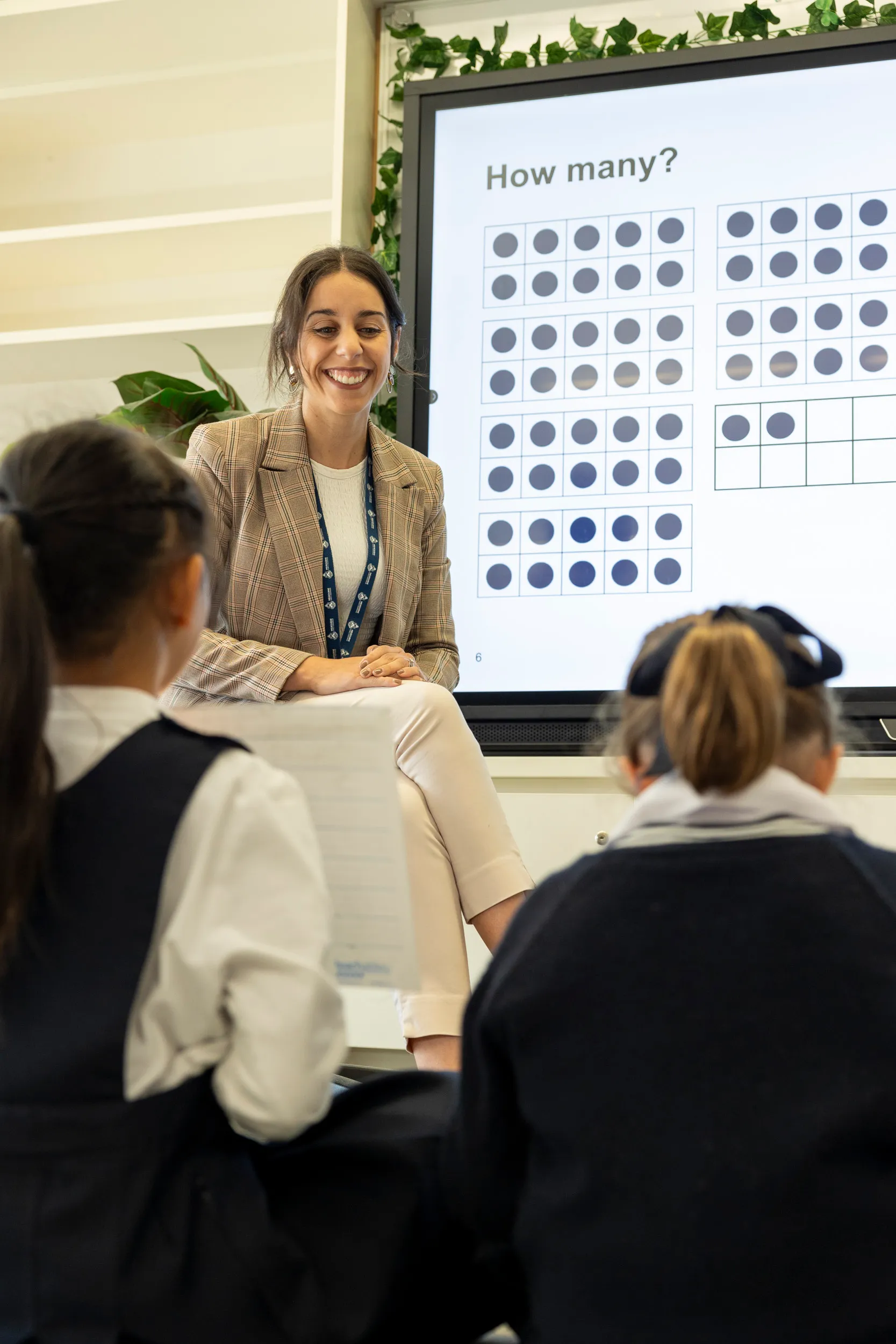
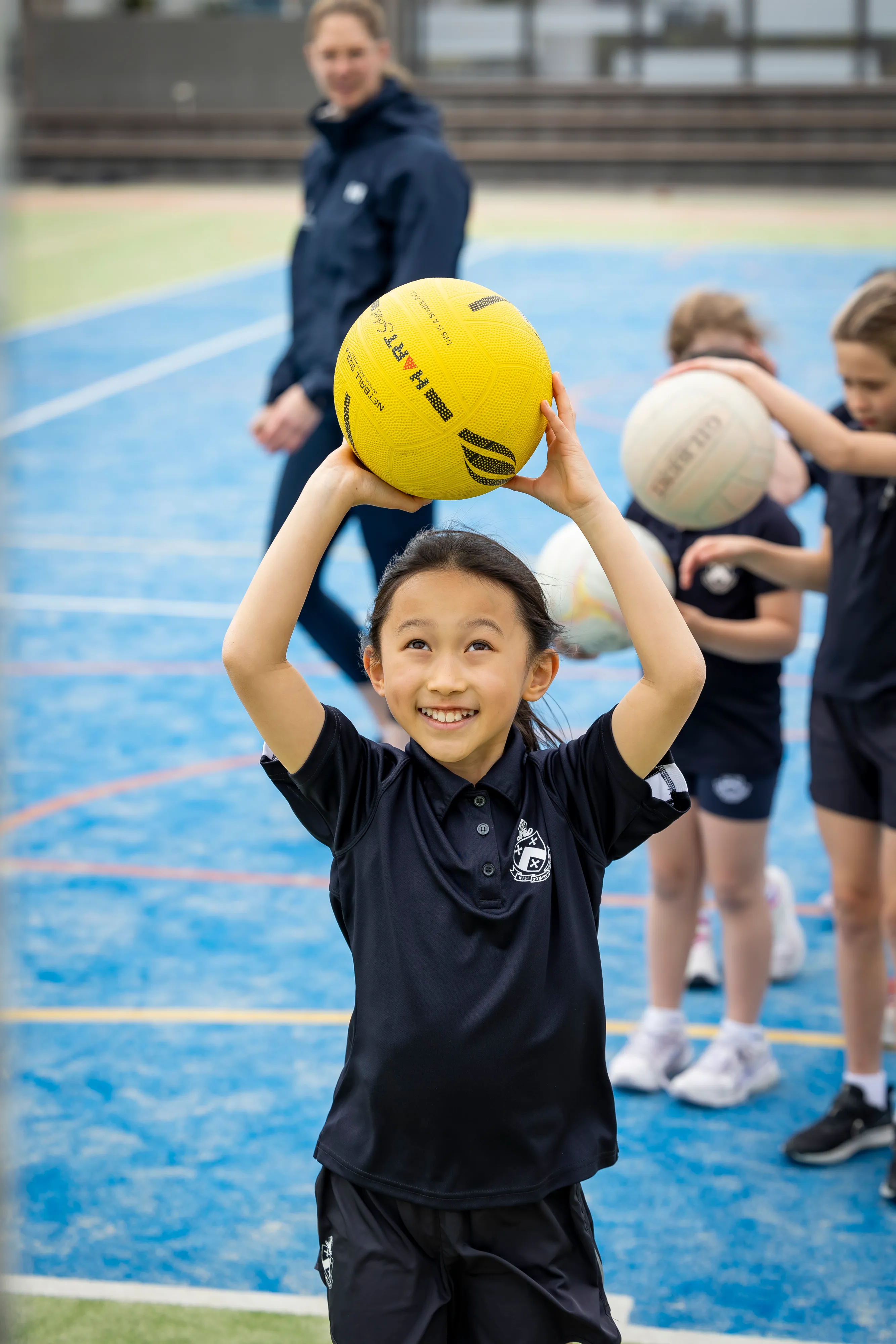
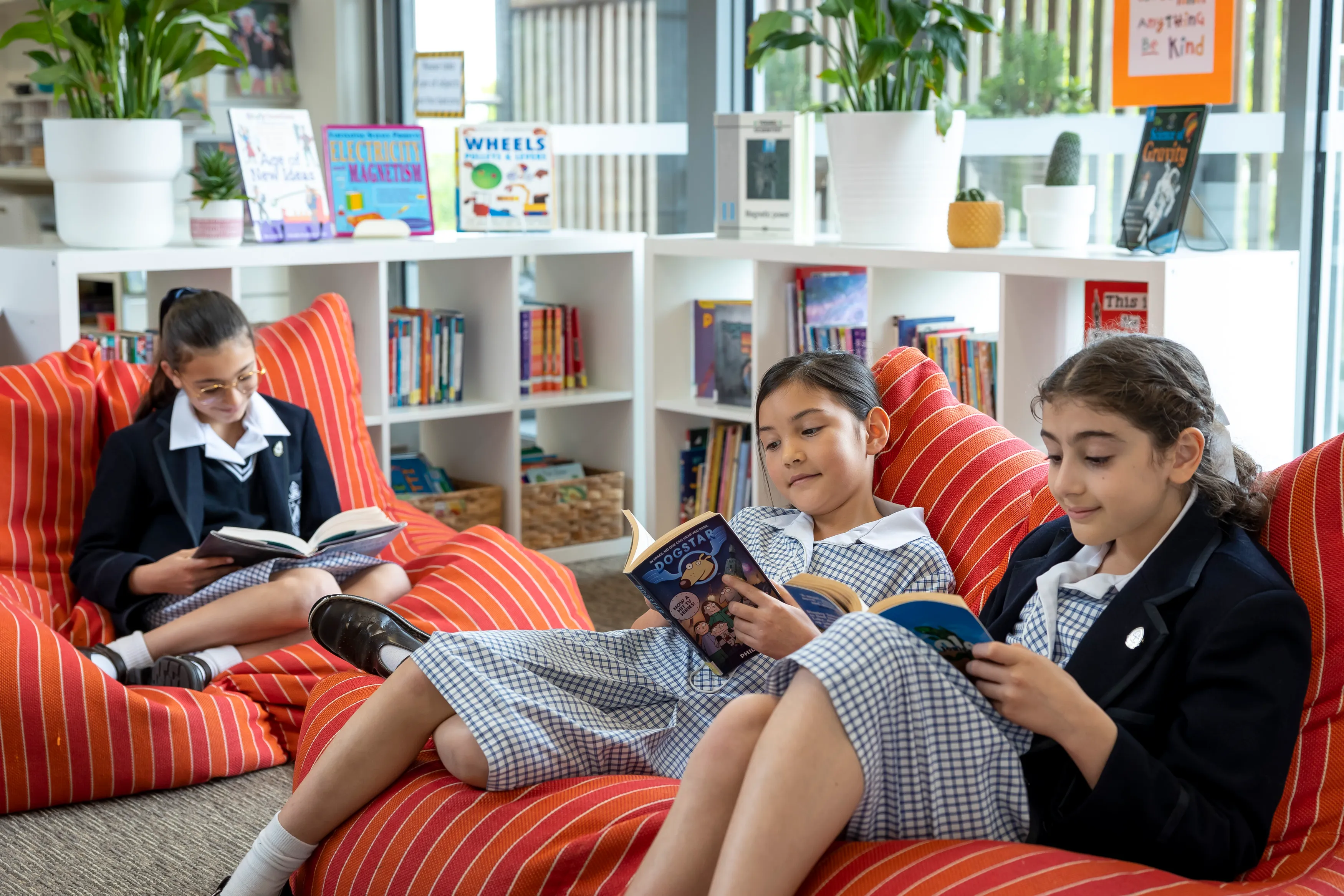
.jpg)
